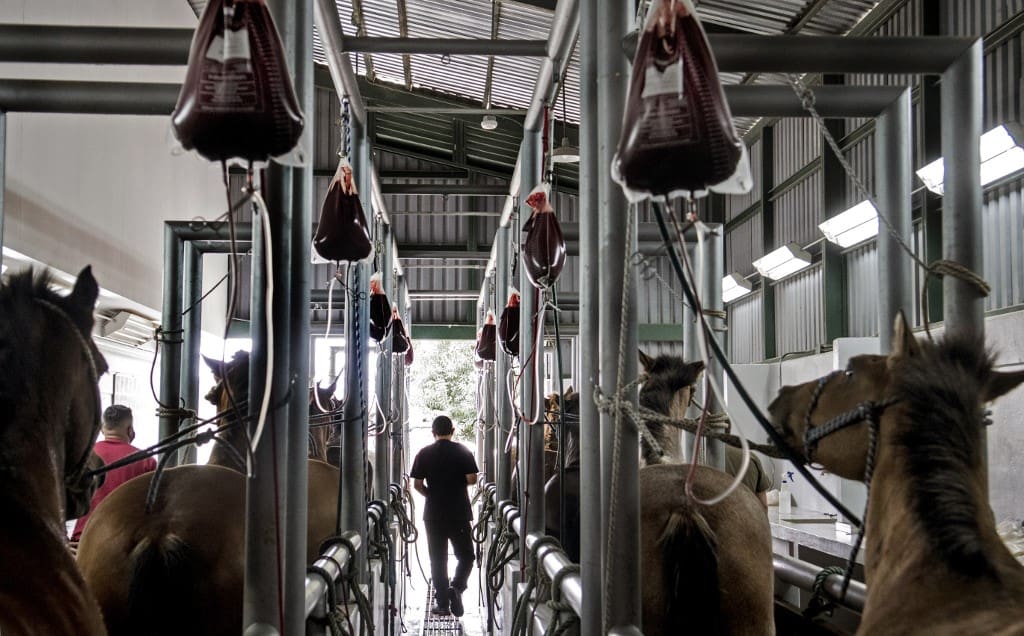An antiviral treatment made with plasma from immunized horses is Costa Rica’s hope to face the growing spread of Covid-19 in the country and avoid the threat of saturation of public hospitals.
The Clodomiro Picado Institute of the University of Costa Rica (UCR) prepared an initial batch of 1,000 vials of 10 ml each with an antiviral that is being tested in 26 patients infected with the coronavirus.
“It is hoped to be able to give it to a patient at an early stage, when the symptoms are not very severe and the viral load is not so great,” Andrés Hernández, the institute’s leading pharmacist, told AFP.
He indicated that the expectation is that the drug can neutralize the virus, in turn reducing COVID-19 symptoms such as fever and difficulty breathing.
Before applying it to patients, the equine plasma antiviral was tested in a laboratory at George Mason University in Virginia, United States, which did the external study and proved its ability to kill the virus.
“We exposed the antibodies produced in horses to various dilutions of the SARS-CoV-2 virus in cell cultures and we showed that the virus was neutralized,” said US researcher Charles Bailey, in charge of the study at the US university.
Clinical trials in progress
The press office of the Costa Rican Social Security Fund (CCSS), in charge of public hospitals, confirmed that the treatment is in Phase 2 of experimentation with 27 patients to determine its effectiveness. If results are positive, the investigation will be extended to a larger group of patients.
The CCSS and the UCR presented preliminary results on October 2, indicating the treatment “proved to be very safe, which suggests adequate (tolerance)” on the part of the patients, indicated physician Willem Buján.
The results support progressing to Phase 3 — in which the plasma will be applied to hundreds of patients — although studies haven’t yet determined the appropriate dose to treat patients according to the severity of their infection, explained Buján, a professor at the Faculty of Medicine from the University of Costa Rica.
The treatment is tested at a time when Costa Rican health authorities warn of an approaching saturation of public hospitals due to the strong wave of infections of the coronavirus, with around 1,000 new cases daily.
Until Friday, October 2, Costa Rica registered more than 77,000 infections and more than 900 deaths associated with Covid-19.
To develop the drug, the institute drew on its half-century experience in the production of antivenom, which it currently exports to other Central American countries, Ecuador, Colombia, Peru, and several African nations.
The Clodomiro Picado Institute obtained the coronavirus proteins from laboratories in China and the United Kingdom and used them to immunize six donated horses for treatment.
“They were followed up to see if they developed antibodies,” Hernández said of the horses.
When it was determined that they had enough antibodies, blood was drawn and the plasma, which contains antibodies, was separated and purified to obtain the solution against the SARS-CoV-2 virus.
Savior horses
The pharmacist explained that the proteins contain the key that allows the virus to invade the cells of the infected person. It’s hoped the antibodies will neutralize their action and that the patient’s body will eliminate it.
On the grounds of the institute in Coronado, in the mountains northeast of San José, there are usually some horses used to obtain antivenom or antiviral for Covid-19.
“We have always worked with horses because it is a docile animal, it is very intelligent and the volume of blood it has allows us to have a large amount of plasma,” Hernández said.
After producing the first thousand doses of the antiviral, the institute hopes to obtain more horses to expand production when the results of the tests are finalized.
The president of Costa Rica, Carlos Alvarado, told AFP that the plasma treatment equipment will be made available to countries and organizations through a voluntary repository created with the support of the World Health Organization (WHO) to share technologies against the new coronavirus.
“This procedure will be shared as intellectual capital developed in the country, it is sought to share it with other people (…) and that they can replicate it,” Alvarado said.






